I recently visited a school in the third most deprived area in the country who now have 77% of Year 6 pupils achieving Level 4 in English, Maths and Science, compared to just 39% three years earlier and a national target of 65%.
The visit had been arranged to provide a group of Danish educators and local authority leaders with the opportunity to exchange their experiences of using IRIS Connect with a UK-based school.
It was a memorable visit for more than one reason.
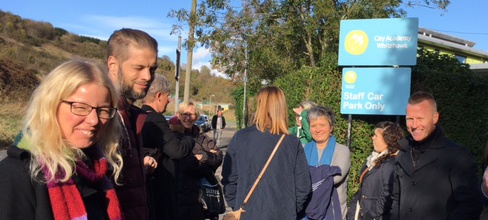
A challenging context of deprivation
The school we visited was City Academy Whitehawk (CAW) a primary school that:
- Provides education and care for 900 students by a team of 40 teachers
- Is located in the most socially deprived area in Brighton and Hove and third most deprived area in the whole country.
- Has a higher proportion of pupils supported by pupil premium than the national average
- Has a higher than average number of disabled pupils, those who have special educational needs, such as behaviour, emotional and social difficulties, and those who need extra support to improve their speech, language and communication skills.
Based on the above statistics and known stereotypes it would be easy to conjure up images of demotivated and unruly children, with harassed and exasperated teachers. That was indeed the case back in 2013 when the current Executive Head, David Williams arrived at the school.
Reaching the ‘Tipping Point’ for a positive culture
Right from the outset, Mr. Williams proposed a vision for the academy which was for all staff and pupils to adopt an ambition to be “Great by Choice”.
The school embarked on a journey aiming to create an environment where all pupils have an entitlement to high-quality teaching and learning
experience. Additionally, the school wanted an ethos focused on building a culture of high aspirations, where a commitment to and engagement in 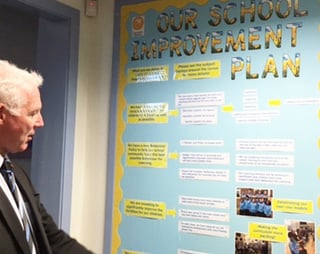 learning is the norm for all children.
learning is the norm for all children.
This was a tall order for some of the parents and pupils and was initially met with resistance and distrust.
Mr. Williams and his team started implementing a cascade of change, that over 3 years would prove transformational not only for the school itself but for the whole community around it.
Their actions evoke the thought of what Malcolm Gladwell describes as “The Tipping Point” in his equally titled book. It is a glaring example of how the right intervention at the right time, focusing on seemingly small goals of changing the environment, ultimately affects other factors and results in significant and sustainable positive changes in behaviour and quality of life (as used to dramatically reduce the crime level in New York City in the 90’s).
Making positive and sustainable changes
Key changes made at the school included:
- Zero tolerance to truancy and aggressive behavior
- Environment change
- Introducing free food for the children
- Introducing a wide range of after-school activities
- Supporting teachers to develop as reflective professionals
- Actively engaging the parents
The team thought through every detail, making changes across the school. From reconfiguring the entrance hall to make it welcoming and orderly, to transforming the classrooms and the outside area into stimulating learning environments. As well as adapting communications with the parents and displaying pupil’s work in corridors.
The team went beyond the immediate focus on the school’s pupils and their short-term attainment: they expanded their reach to influence the local families long before their children become of school age and make a positive impact that is sustainable long after they have left.
An example of this is the soft play area where mothers with babies from the local community are invited to come, meet and chat over a cup of tea while the children play in a safe environment. The goal here is to familiarise both the mothers and babies with the school and discover that far from being a hostile place, it is welcoming and nurturing.
Impact on the wider school and community
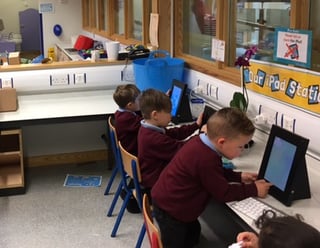 The team successfully engaged the pupils and their families through accountability and ownership: the children are allowed to borrow the school tablets and take them home. Much to the disbelief of some sceptics, none of the tablets have ever gone missing or been forgotten to be brought back to school.
The team successfully engaged the pupils and their families through accountability and ownership: the children are allowed to borrow the school tablets and take them home. Much to the disbelief of some sceptics, none of the tablets have ever gone missing or been forgotten to be brought back to school.
Recognising that the family circumstances of a big proportion of the children might be difficult, the school provides an important element that might be missing from the home environment: encouragement, pride in their work, fostering confidence in the young people and hope for the future.
A (cultural) step in the right direction
Three years later, a new culture has emerged at the academy and it is a completely different environment from its former self. Mr. Williams and his team have been able to nurture a really positive environment for the children where they feel valued, safe, appreciated and rewarded for their achievements.
Consequently, the academic results have been significantly improved, as mentioned at the beginning of this blog. The school’s success has been so great that it recently received an award for Most Improved School of the Year at the Youth in Action Education Awards, hosted by The Argus.
Many aspects of Mr. Williams’ “distributed leadership” style and values resonate with me as we share the same practices at IRIS Connect: trust, empowerment, growth mindset, nurturing learning and confidence. The key point for the school is that they apply these values to the adults and children alike.
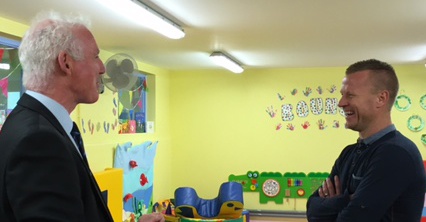
Crucial for the school’s success, Mr. Williams cites the incredible commitment of all of the school’s staff and the efforts and support of the children, their families and the whole community. He also acknowledges the significance of the partnership with and the support from the academy’s sponsors, City College and the Fonthill Foundation, on the school’s achievements.
Teachers at the school are enthusiastic and work collaboratively. Led by Mark Richardson, Year 6 Teacher and Leader of Digital Learning, the teachers use the IRIS Connect video-based professional learning platform to reflect on and share practice for ongoing incremental improvements of teaching and learning. The possibility for the teachers to learn through experience, share and create knowledge in a secure, efficient and cost-effective way is a contributing factor to the overall continuous improvement of the school.
Global influence
Our visitors from Denmark were equally inspired as I was by this success story as the circumstances in Whitehawk are not isolated, unfortunately, but are present in certain cities even in the “happiest country in the world” – Denmark. They found that much can be shared between the schools in Denmark and in our country, so they plan to use the IRIS Connect platform for an extraordinary inter-school collaboration project.
Mr. Williams likens the process of transforming CAW to a journey and invites everyone who wishes to participate onto a bus, with him as the bus driver.
The CAW bus is certainly going in the right direction and already getting far; we at IRIS Connect are proud to be on the bus with them.
To read more examples of IRIS Connect in action, take a look at our case studies >
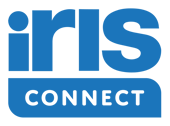


Leave a comment:
Get blog notifications
Keep up to date with our latest professional learning blogs.